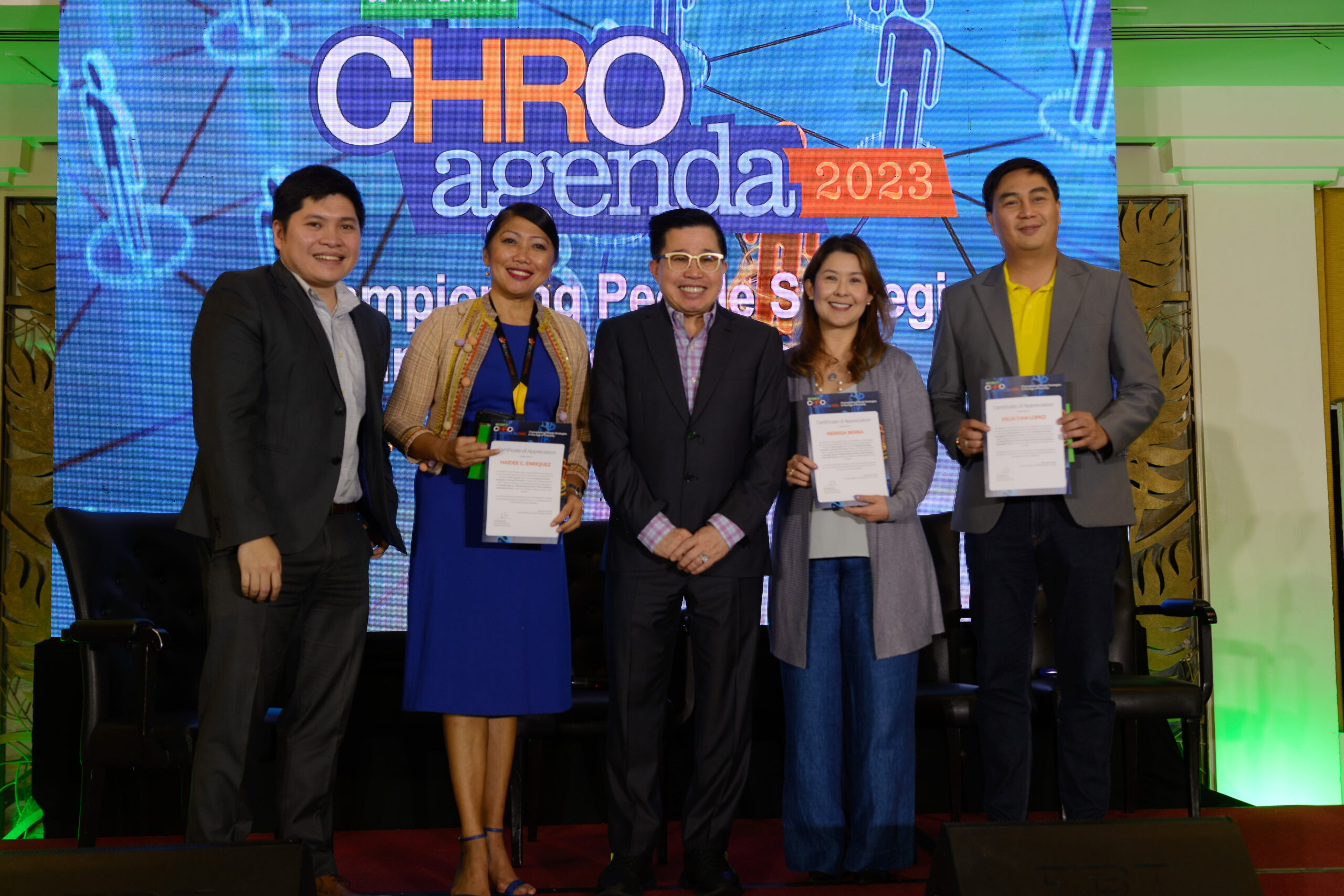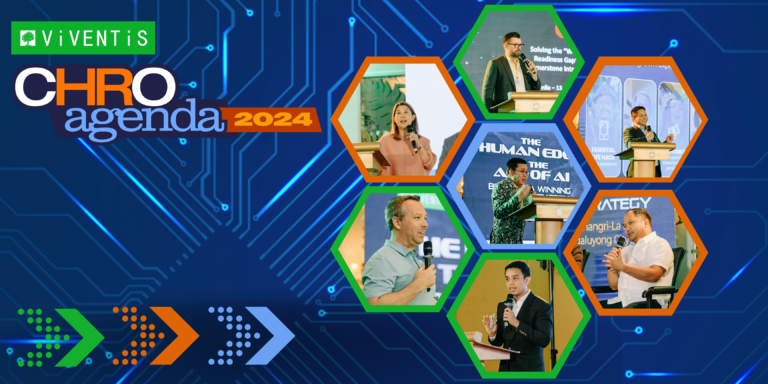In today’s rapidly changing business environment, the role of Human Resources (HR) has become more critical than ever in shaping a sustainable future for organizations. HR professionals are at the forefront of driving employee engagement, development, and well-being while also supporting organizational resilience and agility.
By understanding the evolving demands of leadership, technological advancements, and employee expectations, HR leaders can implement impactful strategies that attract and retain top talent, foster innovation, and create a culture of sustainability.

Following an enriching and informative conversation with IBPAP’s President and CEO, Jack Madrid regarding the prevailing trends, prospects, and obstacles within the human capital landscape, the program progressed to the highly anticipated panel discussion with Viventis Search Asia’s Talent Development Associate Director, Jeremy Pintor featuring distinguished individuals in the corporate landscape, specifically in human resources.
Read Jack Madrid’s talk on Leading Organizations in Endless Crisis
These individuals included Nerissa Berba, Head of Human Capital Management at Security Bank; Felix Dan Lopez, Chief Human Resources Officer of Cebu Pacific Air; and Haidee Enriquez, Chief Executive Officer of MicroSourcing. During the session, each of these reputable figures in the business sector offered their reactions and shared their unique perspectives and best practices based on projected human capital trends for the foreseeable future, particularly in 2023 and beyond.

The Evolving Role of HR (HR as Heroes)
HR has emerged as a strategic partner in organizations, playing a vital role in employee engagement, development, and well-being. Amidst the COVID-19 pandemic, HR has demonstrated resilience and agility in supporting organizational success. The CHROs shared their challenges during the early stages of the pandemic and the measures they took to thrive in difficult circumstances. As organizations face ongoing uncertainty, HR will continue to be instrumental in driving sustainable success and facilitating adaptation to new challenges and opportunities.
Felix Dan Lopez, the esteemed Chief Human Resources Officer of Cebu Pacific Air, shared concrete action plans that his organization implemented in response to the challenges posed by the pandemic and the evolving role of HR in the post-pandemic era.
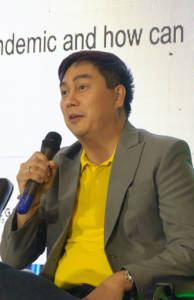
When asked about the crucial role of HR in the post-pandemic era, Lopez emphasized the need for swift organizational pivoting while maintaining a clear long-term vision for employees. Cebu Pacific Air took decisive steps to prioritize key areas and ensure the success of the organization and the well-being of its workforce during these unprecedented circumstances.
The first and foremost action taken by Cebu Pacific Air was to ensure the health and safety of its employees. The organization extended this commitment beyond the workplace by including the well-being of employees’ families and the communities in which they operate. Stringent health protocols, comprehensive safety measures, and regular testing were implemented to safeguard everyone’s welfare.
Recognizing the need to adapt to the crisis, Cebu Pacific Air underwent a thorough restructuring process. Difficult decisions were made, including tough conversations and significant actions, to ensure the well-being of all individuals involved. The organization executed these measures with empathy, prioritizing support and care for employees throughout the process.
To maintain trust and transparency within the organization during this transitional period, frequent and authentic communication was emphasized. Cebu Pacific Air adopted a multi-platform approach, utilizing organization-wide and department-wide town halls, ‘copyhats,’ and interlocking homes to foster open dialogue and keep employees informed and engaged. Through these channels, concerns were addressed, updates were provided, and a sense of unity and support was created.
“There were a lot of conversations, hard conversations that needed to happen. Of course, we have to ensure that we’re doing that the right way with a lot of empathy. The third [aspect] was really [important] because we’re doing the tough decisions, we have to continuously cultivate trust. And how do we do that? Through frequent, authentic communication initiatives, exhausting all possible communication platforms.”
– Felix Dan Lopez, Cebu Pacific
As remote and hybrid work models became prevalent, Cebu Pacific Air actively embraced and adapted to the new work environment. The organization made necessary adjustments to optimize productivity and collaboration, ensuring that employees had the resources and support required for successful remote work. This involved investing in technology infrastructure, implementing remote collaboration tools, and providing training to enhance remote work effectiveness.
Another vital aspect of their action plans was continuous engagement with employees, especially during the implementation of challenging decisions such as pay cuts, freezes, and benefit adjustments. The organization recognized the potential impact on employee morale and motivation and therefore proactively sought ways to sustain engagement. The organization provided support, encouragement, and opportunities for employees to contribute and stay connected, fostering a sense of unity even during difficult times.
By prioritizing employee health and safety, undergoing necessary restructuring, fostering transparent communication, adapting to remote work, and ensuring continuous engagement, Cebu Pacific Air successfully navigated the challenges of the post-pandemic era while upholding the well-being and success of its workforce.
Top CHRO Priorities and Meeting the changing demands of Leadership and the Workforce
Chief Human Resources Officers, as key decision-makers within organizations, play a vital role in adapting to the evolving business landscape. They are responsible for designing effective people strategies that address disruptive technology, changing workforce dynamics, and increasing employee expectations.
By attracting, developing, and retaining top talent, these HR leaders drive innovation and foster engagement. As we approach the conclusion of the COVID-19 pandemic, the global repercussions will require HR leaders to navigate a new era and embrace alternative approaches to work.
These are the areas that will be the most important priorities and trends for HR leaders in 2023:
- Prioritize employee experience to boost satisfaction, attract top talent, and enhance company performance.
- Humanize employee-manager relationships through open communication, empathy, and support for greater engagement and retention.
- Prepare for the future of work by addressing talent and skills shortages through technological advancements, demographic changes, and aligning job market needs with skills.
- Embrace contingent workers for flexible staffing while effectively managing communication and coordination.
- Perfect the hybrid work model by striking a balance between remote and in-person collaboration, promoting inclusivity, and establishing policies for equal opportunities.
- Sustain employee engagement remotely through collaborative, transparent, and adaptable work practices.
- Focus on upskilling and employee development to foster productivity, engagement, and career growth in the evolving work landscape.
Renowned for her expertise, Nerissa Berba, the esteemed SVP/Head of Human Capital Management Group at Security Bank, delivered compelling insights during the panel discussion at the esteemed CHRO Agenda 2023 event. She shed light on the dynamic evolution of the HR role, emphasizing how Security Bank has revolutionized its HR function, transcending its traditional focus on service delivery.
She explained that when she joined the organization, HR was responsible for tasks like payroll and benefits administration. However, they recognized the need to modernize and align HR with the organization’s goals. In October, they introduced HR business partners and Centers of Excellence (COEs) to distribute responsibilities and make HR more sustainable.
Amid the changing landscape, one of their key initiatives was transitioning learning to digital platforms. Despite initial challenges and doubts, they believed digital learning was the way forward, especially considering the uncertainty of classroom settings due to the pandemic. They prioritized investing in employee learning and development to prepare them for 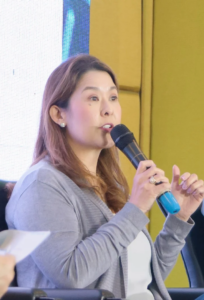 ongoing growth.
ongoing growth.
Understanding employee sentiments became crucial during the major changes caused by the pandemic. Security Bank conducted regular surveys to gauge employee satisfaction and gather feedback. They aimed to create a positive employee experience and provide the necessary support. Additionally, they faced the challenge of equipping managers with the skills to lead virtual teams effectively, considering the bank’s people-centric culture. She emphasized that all HR initiatives at Security Bank revolve around prioritizing employees and putting people first. They proactively sought input from employees on their preferences and implemented initiatives based on the survey results.
In conclusion, the evolving role of HR in the modern business landscape is evident. HR professionals are faced with the challenge of adapting to changing circumstances, such as technological advancements, shifting workforce dynamics, and employee expectations.
By embracing transformation, prioritizing employee well-being, leveraging digital learning, and fostering effective leadership, HR can play a pivotal role in driving organizational success. These insights from industry leaders like Nerissa Berba provide valuable guidance for HR professionals seeking to navigate the ever-changing landscape and create a thriving workplace environment.
HR’s Role in achieving sustainability
The pursuit of sustainability within the organization is driven by the imperative to meet present demands while safeguarding the future and learning from past mistakes. To achieve sustainability goals, HR professionals must cultivate a robust workforce supported by a solid foundation. This involves implementing effective strategies and providing solutions that employees can rely on when needed, and sustaining these initiatives for as long as possible.
By embracing these principles, the organization aims to create a resilient and adaptable organization that can navigate the complexities of the present while forging a sustainable path for the future.
As the panel discussion went on, the panelists shared valuable insights on measuring sustainability and the active involvement of HR in materiality indices. They also emphasized the significance of creating a narrative that effectively engages employees in sustainable practices.
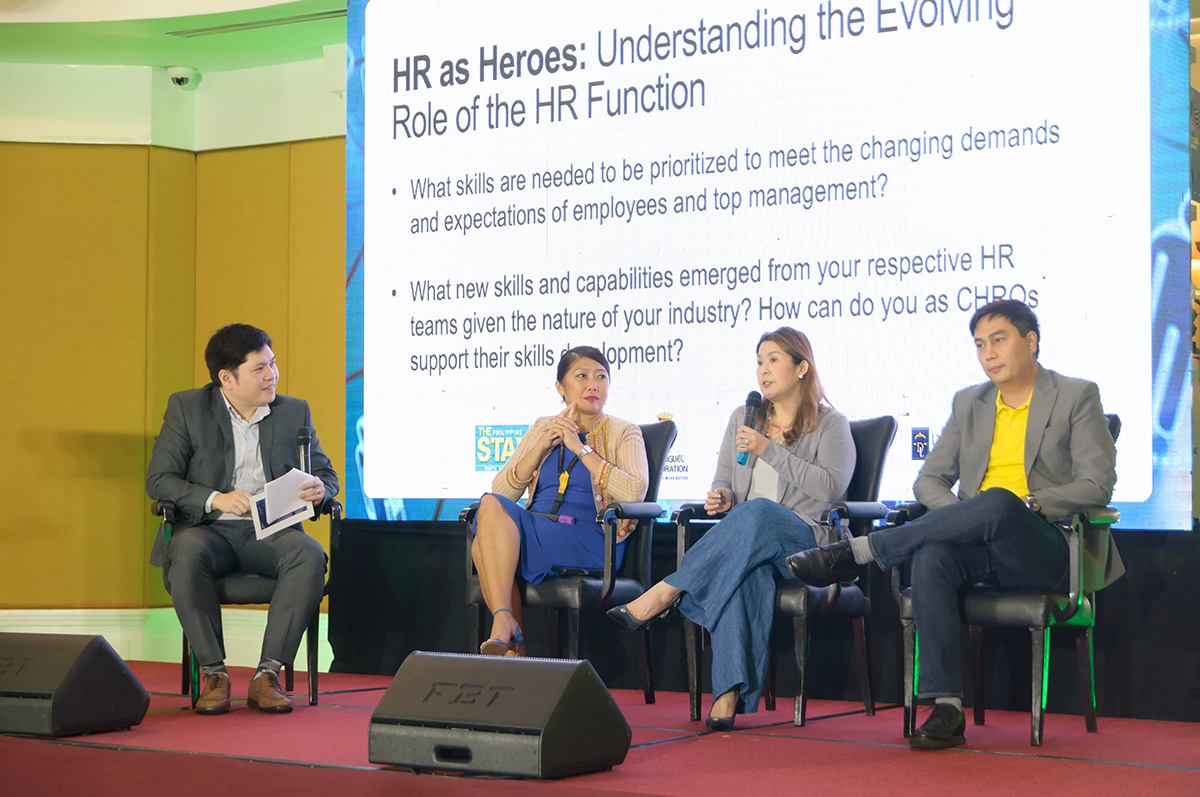
CHRO Felix Dan Lopez stressed the critical role of measurement in driving sustainability initiatives. He highlighted the integration of sustainability into the organization’s balanced scorecard, assigning a specific weightage to showcase its significance. This approach not only demonstrates the organization’s commitment to sustainability but also ensures that it becomes a measurable aspect of the CEO’s assessment. Moreover, Lopez recognized HR’s active involvement in materiality indices, particularly in areas such as talent development, diversity and inclusion, and workplace safety. By including these factors in the indices, HR can effectively contribute to the organization’s overall sustainability agenda.
Meanwhile, SVP Nerissa Berba emphasized the importance of making sustainability relatable to employees and provided examples of initiatives implemented by her bank, such as sustainable finance products and digital learning courses on sustainability. The bank also prioritized employee flexibility to reduce carbon footprints. Berba underscored the significance of talent development and management in ensuring long-term sustainability. She highlighted the need for HR to provide tangible examples, including waste management practices, energy conservation, and promoting the use of personal thermos bottles for meetings. By aligning measurement, narrative, and tangible initiatives, HR professionals can play a pivotal role in driving sustainability and engaging employees in building a sustainable future.
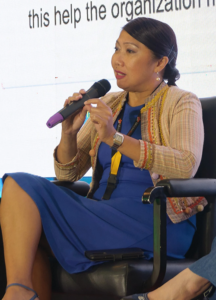
Adding to the wealth of insights shared by the distinguished HR leaders, Haidee C. Enriquez, the esteemed CEO of MicroSourcing, provided valuable perspectives on the subject. She drew attention to the transformation of sustainability pillars from the traditional three Ps to the comprehensive ESG framework. Enriquez emphasized the essential role of HR in the social component of ESG and underscored the power of storytelling to establish a connection between sustainability and employees’ daily lives. She made a clear distinction between CSR and sustainability, highlighting the future-oriented nature of sustainable initiatives. Within HR’s scope, she emphasized the importance of ensuring compliance, fostering diversity, and promoting equitable practices. Furthermore, Enriquez stressed the significance of measuring ESG, facilitating effective communication, and encouraging active employee participation to integrate sustainability deeply into an organization’s culture.
In closing, she urged HR professionals to proactively engage in discussions and align their priorities with the needs of the community.
To summarize, the panelists accentuated the vital role played by HR in spearheading sustainability initiatives. By aligning measurement, narrative, and tangible initiatives, HR can effectively engage employees and ensure the long-term viability of organizations. It is essential for HR to embrace the evolving pillars of sustainability, foster communication, and actively participate in discussions to align priorities with the needs of both the organization and the wider community.
Final Thoughts
Taking all factors into account, understanding the pivotal role played by HR in shaping a sustainable future is essential for driving organizational success. HR professionals occupy a crucial position as they integrate environmental consciousness, social responsibility, and long-term viability into the fabric of the organization. They achieve this by measuring the impact of sustainable practices, engaging employees, and aligning initiatives with evolving principles. Serving as agents of change, they craft compelling narratives that foster a connection between individuals and the greater good, while promoting effective communication to embed sustainable practices as core values within the organization.
By embracing their responsibilities and actively participating in discussions, HR professionals have the power to pave the way for an organization that is resilient and adaptable, capable of meeting present demands while safeguarding the future for generations to come.
Together, the collective efforts can lead to the creation of a sustainable future that harmonizes the needs of the organization, its workforce, and the broader community.

